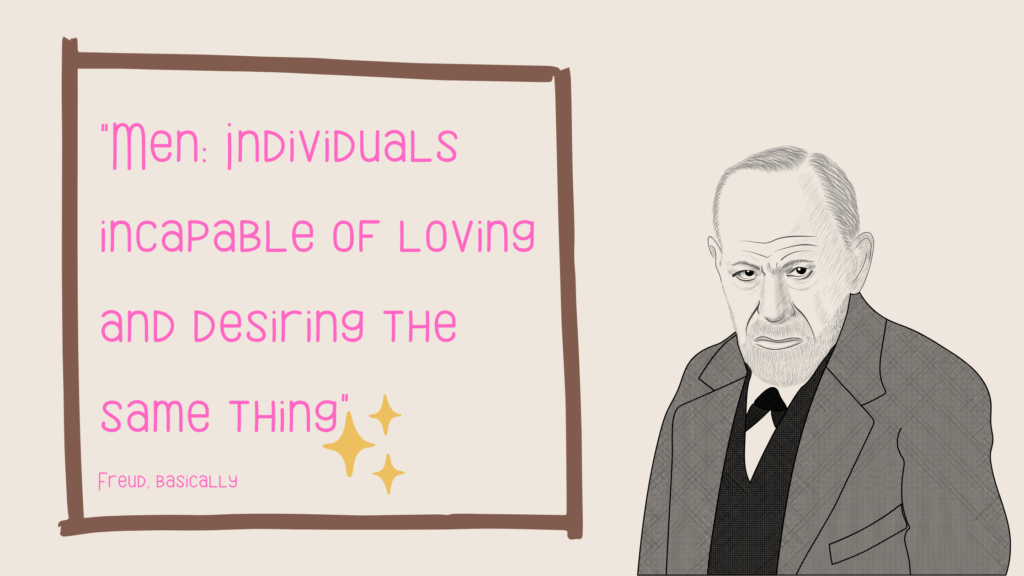“You and I will not be loved if we have desires.”
“My partner might find it difficult to see me as a mother if I am forthcoming in bed.”
I haven’t personally experienced these, but two statements that came to mind when I read about a really problematic concept, a dichotomy: the Madonna-whore complex. And, I’m beginning with these to set the tone for you.
The Madonna-Whore Complex
In the past century, Sigmund Freud has been at the centre of some (questionable) psychoanalytic literature and one of them is the Madonna-whore complex.

This complex talks about the inability of men to maintain sexual arousal within a committed, loving relationship. More precisely, it refers to the inability to show affection to a woman who also has sexual desires; the two cannot coexist.
This complex was said to develop in men who saw women as either (this is the keyword here!) saints they could love or prostitutes they desired. This was observed as a form of anxiety in men when they could not differentiate their feelings for their romantic partner and the mother of their child, for example.
(Before I continue, I would like to do a check-in. Do you spot the deep-rooted misogyny here? Because I remember observing that and feeling furious!)
There have been multiple studies to prove the problematic nature of this complex. One of them was by the American Psychological Association which specifically addressed the fact that the Madonna-whore complex restricts a woman’s autonomy and also impairs most men’s intimate relationships.
One of the most accurate examples, I believe, of the Madonna-whore complex is the conversation between Billy Crystal and Robert De Niro in the film, Analyze This. Billy questioned De Niro about his mistress, to which De Niro said there are things he can’t do with his wife because “it’s the mouth that kisses my children goodnight”.
Laying Out the Misogyny, Loud and Clear
But, as I mentioned above, the Madonna-whore complex has not just proven to cause confusion, anger, and anxiety in men, but also affects women. It rejects the idea that women’s sexuality is a sliding scale and that it changes over time. It puts us in boxes, and just two of them. And thus, is misogynistic in nature.
Every time a “Madonna” is respected for her pure, nurturing self, the other women who are open and honest about their very normal, sexual desires are disregarded and disrespected. We, indirectly so, shame the women that showcase overlapping behaviours or characteristics like a nurturing mother who also has sexual desires.

Even today, the scene from The Breakfast Club is an accurate representation of what a lot of women believe. Allison and Claire, in a conversation about sex, talked about how when you say you haven’t had it, you are declared a prude. But, if you say you have, you are a slut. “It’s a trap. You want to but you can’t and when you do, you wish you didn’t.”
This neat and tidy division of what a woman “should be” forces them to bury a part of themselves, leading to unhappy marriages, lower self-esteem, anger and frustration in relationships.
Today, we’ve come really far regarding open dialogue about women’s pleasure and romantic relationships. But, it would be unfair to deny the fact that motherhood is still seen as a “solution” to a seemingly-rogue woman who is living life on her own terms. The discomfort in expressing, or even understanding our own bodies and pleasure continues to exist.
The effects of Madonna-whore go beyond traditional relationships. Even women may, without the role of a certain partner, reduce themselves to one of these boxes because they’re made to believe that it’s the only way to, say, a happy marriage.
Finally (and funnily), it has been argued that this complex has helped relationship psychologists understand certain cases better. That’s the defence. But, the keyword is relationship psychologists. This complex does more damage than cure when used as a lens of judgement by common people.
Design credit: Our lovely DD woman, Anshika Kushwaha <3

